Expert Witness: December 2010
Allo Darlin'/Jon Langford & Skull Orchard
Expats Ponder Life From Different Directions
Friday, December 03, 2010
 Allo Darlin': Allo Darlin' (Fortuna Pop!)
Allo Darlin': Allo Darlin' (Fortuna Pop!)
"Twee" is such a screwy synonym for "concrete." True, transplanted
Londoner Elizabeth Morris does sport a fetching murmur that's rather
sexy if like me you're attracted to cinemaphiles who appreciate
kissing, and her attendant g-b-d do tend toward strum and clatter. But
she's not as dreamy or small as "twee" implies--her "heart is as
strong as a drummer," exactly. She's rooted, sensible, manifestly on
top of the facts and possibilities of her life as it is, which since
she's still young and relatively privileged include cooking chili with
her sweety and swimming in Sweden in the summertime. In short, she's
getting it while she can and knows it. If this band thing doesn't work
out--as it probably will for a time, because she has the tunes--she
can put off finishing that "legal vocation." Then she'll go back to
school and join a professional class that doesn't command as much
slack as it used to either. A MINUS
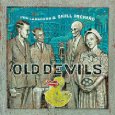 Jon Langford & Skull Orchard: Old Devils (Bloodshot)
Jon Langford & Skull Orchard: Old Devils (Bloodshot)
"Live for next week/Live for last year," the 52-year-old advises
devilishly and also oldly in the lefthand panel of a triptych about
aging that's completed by the unfinished "Book of Your Life" and the
killing "Getting Used to Uselessness." After that, fittingly but
dishearteningly (although under the circumstances that's fitting too),
the songcraft wends its way gradually downhill; not even the title
track provides much of a rise. Only then comes a finale called
"Strange Ways to Win Wars" and Langford is on top of things again--not
young because he's not that kind of liar, just strong and clear-eyed
as he quietly and suggestively surveys our disheartening politics:
"And no one is spared, no one is spared/No one is spared, no one is
spared." B PLUS
Tabu Ley Rochereau/Angola Soundtrack
Looking Back at Kinshasa and Looking Up at It
Tuesday, December 07, 2010
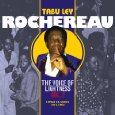 Tabu Ley Rochereau: The Voice of Lightness Vol. 2: Congo Classics 1977-1993 (Sterns Africa)
Tabu Ley Rochereau: The Voice of Lightness Vol. 2: Congo Classics 1977-1993 (Sterns Africa)
With Mobutu squeezing every fantasy of affluence out of Congolese life
as he strove to consolidate his power, soukous's greatest vocalist
felt the pinch as recording studios, pressing plants, and his own
label broke down. And though his velvet tenor remained strong and
flexible as he turned 40 and then 50, his spirit faltered. As usual,
Ken Braun makes the most of a discographical briar patch, most of it
originally released as dance-length two-sided 45s. There's nothing
approaching a clinker on these two CDs--mourning a teacher or going
disco, Tabu Ley remains an ineradicable rumba original, a lover of
melody and leader of men. But only at the start of disc two does the
music enter the transcendant realm where the first volume lives: with
"Kabasele in Memoriam" and "Lisanga Ya Banganga," both long known to
American soukous fans from Franco & Rochereau's Omona Wapi,
whose other two tracks woudld flow right in as well. Conclusion:
although Rochereau has lived a longer and happier life, his rival and
coequal probably lived an edgier and deeper one. A
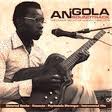 Angola Soundtrack (Analog Africa)
Angola Soundtrack (Analog Africa)
These 18 carefully sequenced, thoroughly annotated tracks are the
musical spoor of the 12-year leadup to a cruelly delayed independence
that was followed immediately by three decades of civil war. Thus it's
even more poignant than the soon-to-be-dashed hopes you hear in the
early pop of other African nations. Given its Lusophone provenance,
its Latinisms are remarkably un-Brazilian, dominated by son, merengue,
and especially the rumba-twice-removed of the big boys just north in
Congo. Song per se doesn't count for much--singing often seems an
afterthought to the basic mode of trebly guitar atop indigenous
polyrhythms, crude and palpably rural compared to the Congolese jams
it emulates and often evokes. But the sense of possibility is undercut
only by the occasional hint of saudade. B PLUS
Scissor Sisters/Of Montreal
Seesawing
Friday, December 10, 2010
 Scissor Sisters: Night Work (Downtown/Polydor)
Scissor Sisters: Night Work (Downtown/Polydor)
No love songs, in case you had any doubts--sex songs exclusively,
which usually involve human connection and occasionally hint at
provisional commitment but rarely evince anything as quotidian as
affection because the quotidian is for day people. In short, Clubworld
without morning-after moralizing. But not without a morning after--for
an early riser like me, the definitive track is "Running Out," a
scarcity song more desperate than any Bruce Springsteen could write
because Springsteen refuses to indulge in despair. Good for him, I
agree. But unfortunately, despair is very much with us. It'll blow up
before it recedes. And this music is intensely committed to escaping
it.
A MINUS
 Of Montreal: False Priest (Polyvinyl)
Of Montreal: False Priest (Polyvinyl)
Though Kevin Barnes begins lucky in love for once, he's all "You're
such a crazy girl" as of track two, then back-and-forths until "Famine
Affair," Sly Stone hyperbole intended. Yet the back-and-forth evokes a
real-life marital seesaw, extreme by normal standards but pretty
convincing coming from a borderline hysteric, especially after the
hysteric's real-life wife Nina breaks her accursed silence in her
native Norwegian. The realistic aura is greatly abetted by co-producer
Jon Brion, whose presence signals Barnes's felt need to put some
bottom on his verbal spew and some body on his sexual
fantasies. Solange Knowles's throaty cameo on "Sex Karma" also helps;
Janelle Monae's cameo is of course spacier. And at the very end comes
a sermon utilizing voice simulation software: "When will certain
people realize/that afterlife is nothing to live for/nothing to die
for/nothing to fight for." Some will surely find this preachy, yucky,
or technologically compromised. I'm just happy I can say amen.
A MINUS
Systema Solar/D.O. Misiani
Afro-Diasporan Groove Meets Border-Hopping Luo
Tuesday, December 14, 2010
 Systema Solar: Systema Solar (Chusma)
Systema Solar: Systema Solar (Chusma)
A goat-voiced Latino-Indian vocalist and a goat-voiced Afro-Latino
vocalist lead two or three turntablists/samplers/keyboardists(?), a
trap drummer, and a conga player to an irrepressible
Colombian-Caribbean street party. The "genre" is piko, as the
amplification-mad coastal sound systems are called--though there's
plenty of cumbia in these grooves, they range much further, including
some of the itchiest scratching on recent record. And it don't
stop. Compare any current salsa record and you'll hear the difference
immediately--this stuff is much rawer. It's the music of people who
are overjoyed to be able to put their hardships aside for an hour or
two. They know the hardships are still there, but they haven't been
sapped by them, and they need to prove that to themselves and the
world. A MINUS
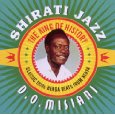 D.O. Misiani and Shirati Jazz: The King of History (Sterns Africa)
D.O. Misiani and Shirati Jazz: The King of History (Sterns Africa)
This rebellious, outspoken, girl-happy Tanzanian Luo put himself in
the forefront of Kenya's Luo-speaking benga style in his late twenties
and was in his forties by the time two Shirati Jazz albums were
released Stateside in the '80s, which was also when both were
recorded. So just as Benga Blast!, a selection of Kenyan
singles, bubbled more irresistibly than Benga Beat, cut later
in London, the added effervescence of the chattering guitar and
hyperactive bass on these 13 '70s dance tunes speaks well of Misiani's
youth. Most of the front-loaded ones are social commentary, but about
midway through six women's names bum-rush the track listing. Misiani
had four wives and died in 2006--the victim, like his fellow Luo
Barack Obama Sr., of an automobile accident. He was still
recording. A MINUS
Bouncing Cats
Hip-Hop Heroes
December 17, 2010
Bouncing Cats--which I saw last night at NYU's Eisner & Lubin Auditorium, where the Clive Davis Department of Recorded Music topped off the film's brief festival run by organizing a promotional screening designed to improve its access to distribution--isn't really a music doc. It's a hip-hop doc--or rather, a documentary about hip-hop culture, a sometimes sanctimonious concept that makes nothing but sense in this context. As directed by Australian-born hip-hop video director Nabil Elderkin, who intersperses b&w and color for neo-realist effect and exploits pace and structure to suck the viewer in, Bouncing Cats gives the lie to any cynic, myself occasionally included, who doubts hip-hop's ability to make a difference in the lives of the downpressed. The downpressed in question live in Uganda, one of the poorest countries in the world, where Abramz Takla, orphaned by AIDS at seven, has created the remarkable B.P.U.: Breakdance Project Uganda. The title comes from the music the breakdancers supply themselves when they can't afford recorded beats, which is often: a chant of "Bouncing cats/Buh-bouncing cats." Narration is by Common, but the narrative line is provided by Rock Steady Crew breakdancer Crazy Legs, who travels to Uganda to give B.P.U. classes through the good offices of Red Bull, which sponsors both Elderkin and Crazy Legs.
Early on Crazy Legs explains why visiting Uganda is such a natural for a veteran of hip-hop's early days: "The South Bronx at that time could have been a Third World country." I groaned at this condescending analogy, but it's a setup. Soon Crazy Legs is entering a building so crammed with B.P.U. members that he suggests sending half of them outside and is told that half the kids who showed up are already outside. But relatively speaking, the skill-sharing stuff is pro forma--almost a setup itself. The payoff is the lives the B.P.U. is changing and the environment in which this change must take effect. This is where pace comes in. The first case study is a typical albeit compelling male youth, the second a cop's daughter who attends school irregularly because her family can't always afford the fees. Then Crazy Legs begins to explore the Ugandan capital of Kampala, where B.P.U. is based. As he watches kids pick their way barefoot through muck that often includes raw sewage, those condescending analogies disintegrate for him. But Elderkin is just getting started. Next he moves the action to Kampala's worst slum, Kisenyi, where many sit listlessly in the fetid heat and kids survive by collecting scraps all day--of what isn't specified, but it's hard to believe much of it is marginally edible.
Had enough? That's what you think. Kampala is in the well-off part of Uganda. Up north is where for decades Joseph Kony's nominally Christian Lord's Resistance Army abducted child soldiers and terrorized anyone not allied with his Acholi tribe. Abramz finds that Kampalans are so appalled by the news from the north that they try to pretend it doesn't exist even though Kony has been forced over the border. So naturally he establishes a B.P.U. branch in the terror town of Gulu, and brings Crazy Legs up there. Then more case studies: a sweet, shy, teenaged artist comes out of himself as he learns some moves, a 16-year-old in the care of his AIDS-afflicted uncle dreams of becoming a doctor. Crazy Legs becomes visibly troubled as he continues to look around; once Elderkind catches him wiping away tears. Finally there's John, a non-Acholi father of two who's had his lower nose and upper lip cut off by the L.R.A. I've read about these things; maybe you have too. It's painful. Seeing is much worse--when the camera leaves John, you sigh in relief. Except that John becomes the last B.P.U. recruit we meet. We watch Abramz teach him. The last quarter of the film returns often to his face. It takes on a beauty.
Abramz is the hero here, but not the only one. Crazy Legs wants to nominate him for a Nobel Peace Prize, but a woman in the film already has been: Jolly Okot, an L.R.A. abductee who is now a mainstay of a Gulu relief organization called H.E.A.L.S. And the breakdancers are all heroic by simple dint of taking pride in a skill--a skill that both honors the past of their dance-positive culture and has a measure of glamor, modernity, and affluence about it. As Somalian-Canadian rapper K'naan puts it: "It's a personal solution, not a practical solution. But it can lead to a practical solution." K'naan is the most articulate and knowledgeable of a commentariat that includes Mos Def and will.i.am, and his music is prominent on the soundtrack as well. You can see how the pop optimism of his style, which is derided by some hip-hop hards, connects to the positive attitude most of the Ugandans on camera refuse to give up.
There was discussion after the screening, and someone asked Crazy Legs about the aftermath of his visit. One of his answers was "I had to get used to eating again." But his first sentence was the most revealing: "I did not want to hear about anyone's problems when I got home."
Bouncing Cats will probably not be distributed in theaters, but Red Bull is exploring other avenues: TV, DVD, pure digital. The film has a website, bouncingcats.com, if you have any leads. All profits will go to Breakdance Project Uganda.
Care Bears on Fire/Sleigh Bells
Brooklyn Goils Express Themselves
Tuesday, December 21, 2010
 Care Bears on Fire: Girls Like It Loud (S-Curve download)
Care Bears on Fire: Girls Like It Loud (S-Curve download)
Brooklyn 15-year-old Sophie and her BFF Izzy have had a band since
fifth grade and were profiled cute in New York magazine in 2006. They
still have plenty of time for premature burnout. But kids can be so
gratifying sometimes, and this EP is all about progress. Fountains of
Wayne-aided and Donnas-influenced, their mildly enjoyable 2009
full-length was bratty-dreaming-slutty, its assorted putdowns less
punk than they thought. Here Sophie permits herself enough
introspective vulnerability and messy yearning to tug a dad's heart:
"What I Could Be" ("You can't understand what it's like being shy")
and "Ask Me How I Am" ("Satisfied and OK," only she's fronting to be
polite). After that she's freed up to bet her probably excessive
allowance on a putdown called "ATM." She also covers a Marbles song
about star dreams I never noticed at CB's and doubt her mom is old
enough to have heard in the flesh. The Tears for Fears song she may
have. A
 Sleigh Bells: Treats (Mom + Pop)
Sleigh Bells: Treats (Mom + Pop)
Exploiting a simple yet extreme-seeming variation on indie's
noize-toon dichotomy, a made-to-order thrill-of-the-whatever band
crosses the Jesus and Mary Chain and the Yeah Yeah Yeahs. Derek
Miller's orchestrated distortions combine the crudeness of the Reid
brothers and the virtuosity of Nick Zinner while Alexis-not-Alison
Krauss plays the female principle for a childlike sweetness belied by
what lyrics you can make out, which suggest in toto that what little
human contact this band makes room for will have to wait until such
time as sonic immersion fails to satisfy their spiritual
yearnings. That their most charming song by far is the straight George
Clinton rip "Rill Rill," which leaves open the question of what they
can do for an encore. I'll grant that minimalist bands always leave
that question open if you'll grant that too often the answer is repeat
themselves. A MINUS
Rachid Taha
"Happy Holidays" Is a Copout--A Merry Secular Christmas to You
Friday, December 24, 2010
 Rachid Taha: Bonjour (Knitting Factory)
Rachid Taha: Bonjour (Knitting Factory)
In 2009 the Algerian-born internationalist set down in New York and
recorded 10 terrific tracks sans Cantabridgian avant-eclectic Steve
Hillage and avec Parisian chanson-rocker GaŽtan Roussel. On the whole
they're prettier than his casbah-rocking norm, especially the love
songs that open and close, and when he claims that the uncommonly
cushy Middle Eastern beat on "Ha Baby" is actually part-country (as in
Nashville country, really), you can half hear what he means. Quality
dips ever so slightly tracks six-through-eight, including a
celebration of ancient Arab-Jewish amity and a whispered one he IDs as
"how to talk about death while staying alive." But my only real
complaint is that there are no trots--just enticing descriptive
phrases alongside mostly Arabic script, though not on the title track,
which begins "Hello Kitty bonjour Violent Femmes." In a world where
too many are set on paradise, I believe this guy is committed to the
party of this world, which is also my party, and I want ever detail I
can get.
A
 Rachid Taha: Diwan 2 (Wrasse '06)
Rachid Taha: Diwan 2 (Wrasse '06)
It's almost cheating--as on the 1998 Diwan, the rai-rocker
simply raids an enormous store of popular music for surefire tunes few
non-Arabic speakers have heard and fewer noticed. Many have a good
beat, too, though not as frantic as Taha prefers. That's why he throws
in two Steve Hillage-aided originals, both also aided by Kadi
Bouguenaya, whose reed-blown flute sets "Ah Mon Amour" wailing. Still,
the melodies carry the album--melodies an older Taha is singing with
more heart and soul and arranging with fewer Cairo strings. The
excellent translations sing love's passion more than they bemoan its
pain. But the tunes make the sturm and drang seem worthwhile either
way.
A
Nicki Minaj/Far East Movement
Aftermath of The E.N.D.
Tuesday, December 28, 2010
 Nicki Minaj: Pink Friday (Young Money/Cash Money)
Nicki Minaj: Pink Friday (Young Money/Cash Money)
Not only are those not her breasts, at least not the ones her
biologicals gave her, but her hair isn't really pink or, wink wink,
straight. Not only is the quick-lipped hoyden of the year all "Young
Money, Cash Money, yeah I'm Universal" with every upper-case except
the "I" discretionary, but she's consorting with Natasha Bedingfield
and reminding will.i.am how he did it. Half rapping and half singing,
half bragging and half kowtowing, brazening a "punt" rhyme here and
proclaiming commonality with "girls that never thought they could win"
there, she's proud to be shameless, with the hooks to back it up. She
knows well the presumably stolen words of her male
collaborator-counterpart Drake: "Everybody dies but not everybody
lives." And damn right she calls this living. A
 Far East Movement: Free Wired (Cherrytree/Interscope)
Far East Movement: Free Wired (Cherrytree/Interscope)
If everything here had the propulsion of "Like a G6," this would be
2010's answer to The E.N.D., forget the more likely-seeming
candidate. Instead, a one-hit wonder their tribute to the Gulfstream
65 jet will remain. The other nine three-minute songs are more like
little Fokkers--party-ready, Auto-Tuned electrohop whose disposable
superficiality is an aesthetic principle and whose guest list is a
reality show waiting to happen. R. Tedder of One Republic and S. Dogg
of Faux Murder LLC? In this context, they could be the same dude. Not
so Keri Hilson or Kate Pierson, however. In the morning, they remain
hard-working Asian-American lads who respect their
mothers. B PLUS
Eminem/Big Boi
Comebacks, Yes. Trumphs, No.
December 31, 2010
 Eminem: Recovery (Aftermath/Interscope)
Eminem: Recovery (Aftermath/Interscope)
The comeback is for Eminem, not Slim Shady--and for Marshall at his
most martial. His most confessional as well--he admits Relapse was
"ehh," admits he came this close to beefing with Wayne and Kanye,
admits "I'da had my ass handed to me." No matter how cleverly he's
rhyming, which varies, he could use subject matter beyond
married-to-the-game and his traditional obsessions. But with Shady in
the shadows, rarely are these themes lifted by Em's long-recessive
sense of play. Bringing the proceedings over the top, however, are the
three final tracks: Rihanna's "Love the Way You Lie" hook depositing
some bodily fluids on Em's conjugal seesaw, "You're Never Over"
nailing Marshall's love for Proof, and the bonus boast "Untitled"
renewing our love for Shady. And delivering the best music qua music
in 77 minutes is none other than Lil Wayne, whose 16 on "No Love"
would be the funkiest thing here if Wayne didn't then hand Eminem his
ass back by inserting acutely timed grunts and such for the rest of
the track.
A MINUS
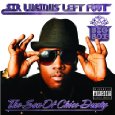 Big Boi: Sir Lucious Left Foot . . . The Son of Chico Dusty (Def Jam)
Big Boi: Sir Lucious Left Foot . . . The Son of Chico Dusty (Def Jam)
Last things first: I wish I could never again hear the jocularly
misogynist David Blaine skit at the ass end of "General Patton" in my
entire life. But it's not tracked, so insofar as the pervasive albeit
incoherent musicality of this overrated good album calls me back, it
will always be there to waylay me. Granted, so will a succession of
enjoyable songs with plenty to offer. But direct comparison to any
post-Aquemini OutKast establishes not Andre's
superiority--that's ambition and always has been--but the congruence
of two timbres and deliveries that resembled each other far more than
did the big boys who put them across. I feel the juice of Big Boi's
"dark fudge brownie with the nut of your choice" and cheer when he
mocks "coke-ayena." But without OutKast's synergy, few of his many
good moves are slam dunks. "Like a crocodile walking round with
alligator skin"? Couldn't have said it better myself.
A MINUS
Postnotes
Peter Stampfel & Baby Gramps: Outertainment (Red Newt): "way over a century of knowledge of American music, way over a century's common ground," but also, "I enjoy the possibility of going nuts" ("Bar Bar," "Ghost Train of Freak Mountain"). ***
Peter and ZoŽ Stampfel: Ass in the Air (Jolly Olga): the new originals are precious, the remakes worth the reminder ("Demon in the Ground," "We're Still Here"). ***
MSN Music, December 2010
| November 2010 | January 2011 |
 RSS
RSS